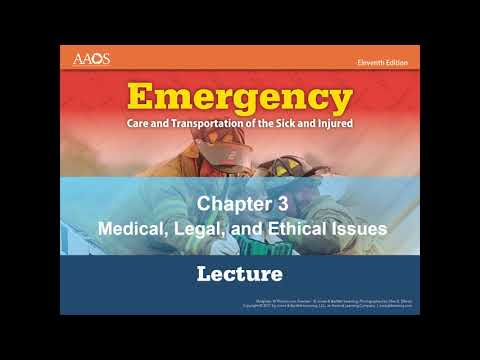Chapter 3 Legal Issues Every Medical Assisting Student Needs to Know
Contents
- The health insurance Portability and Accountability Act (HIPAA)
- The Health Information Technology for Economic and Clinical Health Act (HITECH)
- The Family Educational Rights and Privacy Act (FERPA)
- The Americans with Disabilities Act (ADA)
- The Occupational Safety and Health Act (OSHA)
- The Clinical Laboratory Improvement Amendments (CLIA)
- The health care Quality Improvement Act (HCQIA)
- The Patient Safety and Quality Improvement Act (PSQIA)
- The Federal Food, Drug, and Cosmetic Act (FD&C Act)
- The Federal Trade Commission Act (FTCA)
The third chapter of our medical assisting course covers legal issues. In this blog post, we’ll go over some of the key topics you need to know to be a successful medical assistant
Checkout this video:
The health insurance Portability and Accountability Act (HIPAA)
The health insurance Portability and Accountability Act (HIPAA) was enacted by the United States Congress in 1996. The main purpose of HIPAA is to make it easier for people to keep their health insurance especially when they change or lose their jobs. Another goal of HIPAA is to protect the confidentiality and security of people’s health information.
Under HIPAA, covered entities must take steps to protect the confidentiality of protected health information (PHI). Covered entities include health plans, healthcare clearinghouses, and healthcare providers who conduct certain transactions electronically. These transactions include claims, benefit eligibility verification, and referral authorization. Protected health information means any information that can be used to identify an individual and that is created or received by a covered entity.
Protected health information includes, but is not limited to:
-Names
-Addresses
-Birth dates
-Social security numbers
–health insurance policy numbers
-Account numbers
-Unique identifier numbers
The Health Information Technology for Economic and Clinical Health Act (HITECH)
The Health Information Technology for Economic and Clinical Health Act (HITECH) was enacted in 2009 as part of the American Recovery and Reinvestment Act. The): act addresses the privacy and security of health information created or maintained by electronic means (“electronic health information” or “EHI”). It strengthens the enforcement provisions of the HIPAA Privacy and Security Rules, provides individuals with new rights to their health information, and imposes several new obligations on covered entities and business associates.
The Family Educational Rights and Privacy Act (FERPA)
The Family Educational Rights and Privacy Act (FERPA) is a federal law that protects the privacy of student education records. FERPA gives students the right to inspect and review their education records, the right to seek amendment of their education records, and the right to have some control over the disclosure of information from their education records.
The Americans with Disabilities Act (ADA)
The Americans with Disabilities Act (ADA) is one of the most important pieces of legislation for medical assisting students to be aware of. The ADA is a civil rights law that prohibits discrimination against individuals with disabilities in all areas of public life, including workplaces, schools, and other public and private facilities.
Under the ADA, individuals with disabilities are entitled to reasonable accommodations in order to participate fully in all aspects of society. In the workplace, this means that employers must provide employees with disabilities the same opportunities as everyone else, and make reasonable accommodations for their unique needs.
In order to be protected under the ADA, an individual must have a physical or mental impairment that substantially limits one or more major life activities, have a record of such an impairment, or be regarded as having such an impairment. Major life activities include walking, talking, breathing, seeing, hearing, learning, and working.
The ADA has had a profound impact on the medical field by increasing accessibility for individuals with disabilities and ensuring that they receive the same high quality of care as everyone else. Medical assistant students should be familiar with the requirements of the ADA in order to best serve their patients and employers.
The Occupational Safety and Health Act (OSHA)
The Occupational Safety and Health Act (OSHA) is a federal law that was enacted in 1970. The law was created to protect workers from exposure to hazardous conditions, and it requires employers to provide a safe and healthful workplace.
Most workers in the United States are protected by OSHA standards, although there are some exempt categories of workers, such as those who work in agricultural jobs or certain types of construction jobs. In addition, some states have their own occupational safety and health programs that cover state and local government employees, and these programs must be at least as effective as the federal OSHA program.
OSHA standards are divided into two categories: general industry standards and construction standards. The standards address issues such as electrical hazards, Fall prevention, confined spaces, and more.
Employers who violate OSHA standards can be fined by the federal government. Workers who are injured or become ill as a result of exposure to hazardous conditions at work can file a complaint with OSHA. If OSHA finds that there is a problem at the workplace, they can investigate and issue citations to the employer.
The Clinical Laboratory Improvement Amendments (CLIA)
The Clinical Laboratory Improvement Amendments (CLIA) were enacted by Congress in 1988 in response to reports of inaccurate and unreliable laboratory testing. The CLIA program sets quality standards for all clinical laboratories that perform testing on human specimens for the diagnosis, prevention, or treatment of disease. These quality standards include personnel qualifications, test methods, quality control procedures, and pre-analytic, analytic, and post-analytic phases of testing. Clinical laboratories that meet these standards are issued a Certificate of Waiver, Certificate of Compliance, or Certificate of Accreditation by CLIA.
In order to ensure that patients receive accurate and reliable test results, laboratories must have adequate safeguards in place at all phases of testing. The pre-analytic phase includes specimen collection and specimen processing; the analytic phase includes specimen testing; and the post-analytic phase includes result reporting and follow-up on abnormal results. Each phase has its own set of quality standards that must be met in order to ensure accurate and reliable test results.
All laboratories that perform tests on human specimens for the diagnosis, prevention, or treatment of disease must be certified by CLIA in one of three categories: waiver, compliance, or accreditation. Laboratories that meet the criteria for a waiver are exempt from CLIA certification; however, they are still subject to state licensure requirements. Laboratories that meet the criteria for compliance are issued a Certificate of Waiver or Certificate of Compliance by CLIA. Laboratories that meet the criteria for accreditation are issued a Certificate of Accreditation by CLIA.
The type of certificate issued to a laboratory depends on the complexity level of the tests performed at that laboratory. Waiver certificates are issued to laboratories that perform only waived tests; compliance certificates are issued to laboratories that perform moderate-complexity tests; and accreditation certificates are issued to laboratories that perform high-complexity tests.
The health care Quality Improvement Act (HCQIA)
The Health Care Quality Improvement Act (HCQIA) of 1986 was enacted by Congress to encourage physicians to participate in quality improvement activities and to restrict the actions of state licensing boards when taking disciplinary action against a physician. The HCQIA also outlines procedural protections for physician peer reviewers. The law has been amended several times, most recently in 1990.
The HCQIA applies to any entity that is accredited by the Joint Commission on Accreditation of Healthcare Organizations (JCAHO), any national accrediting body recognized by the U.S. Department of Health and Human Services (HHS), or any state peer review process that has been granted immunity from antitrust laws.
The HCQIA protects two types of peer review activities:
1) quality review activities, which are designed to improve the quality of patient care, and
2) professional review activities, which are designed to assess a physician’s professional conduct or competence.
Both types of peer review activities are confidential and enjoy statutory immunity from civil suit under federal law. In addition, states are preempted from enacting laws that would interfere with the HCQIA’s protections for quality and professional review activities.
The Patient Safety and Quality Improvement Act (PSQIA)
The Patient Safety and Quality Improvement Act (PSQIA) was enacted in 2005 in response to public concern over the number of medical errors that occur in the U.S. healthcare system. This law provides a mechanism for healthcare organizations to report and learn from adverse events, Near Misses, and dangerous conditions.
The PSQIA promotes patient safety by:
-Encouraging the reporting of patient safety events;
-Establishing patient safety organizations (PSOs) to collect and analyze patient safety data;
-Protecting the confidentiality of patient safety information; and
-Promoting the dissemination of information about best practices for preventing patient safety events.
All healthcare organizations that report patient safety data to a PSO are required to have a Patient Safety Plan in place. This plan must address how the organization will identify, track, manage, and reduce or eliminate risks to patients. The plan must also include provisions for training staff on how to report patient safety events and participate in quality improvement initiatives.
The Federal Food, Drug, and Cosmetic Act (FD&C Act)
The Federal Food, Drug, and Cosmetic Act (FD&C Act) is the primary federal law governing food, drugs, and cosmetics in the United States. The FD&C Act requires that all products intended for human use be safe for their intended use and properly labeled. In addition, the FD&C Act gives the U.S. Food and Drug Administration (FDA) authority to take action against products that do not meet these requirements.
The FD&C Act defines cosmetics as “articles intended to be rubbed, poured, sprinkled, or sprayed on, introduced into, or otherwise applied to the human body…for cleansing, beautifying, promoting attractiveness, or altering the appearance.” This definition includes products such as skin creams and lotions, perfumes, makeup, shampoos, hair dyes, toothpastes and deodorants. The FDA does not have authority under the FD&C Act to require manufacturers of cosmetics to test their products for safety before marketing them. However, manufacturers are responsible for ensuring that their products are safe for consumers to use.
The FD&C Act prohibits manufacturers from marketing cosmetics that are adulterated or misbranded. A cosmetic is considered adulterated if it contains a poisonous or deleterious substance that may make the product unsafe for consumers when used as directed on the label. A cosmetic is considered misbranded if it:
-Has misleading packaging or labeling
-Contains an unapproved color additive
-Does not include required information on the label
-Is offered for sale in violation of FDA requirements
The Federal Trade Commission Act (FTCA)
The Federal Trade Commission Act (FTCA), 15 U.S.C. 41-58, as amended by the Telemarketing and Consumer Fraud and Abuse Prevention Act (TCFPA), 15 U.S.C. 6101-06, prohibits unfair or deceptive acts or practices in or affecting commerce.1 The FTC has broad authority under the FTCA to take law enforcement action against false, misleading, or deceptive advertising claims in all media, including print, broadcast, Internet, and direct mail.2 In addition, the FTC can bring cases involving violation of commission rules, orders issued by the commission, or other laws enforced by the commission.3
The phrase “unfair or deceptive acts or practices” is defined in Section 5 of the FTCA to include:
(A) passing off goods or services as those of another;
(B) misrepresenting the source of goods or services;
(C) falsely representing that goods or services have been endorsed by another person;
(D) falsely representing that goods are original or new;
(E) misrepresenting the reasons for, existence of, or amounts of price reductions;
(F) representing that a transaction is not subject to a requirement under law because such requirement is not expressly stated when such requirement otherwise would apply to such transaction; and
(G) disparaging another person’s goods, services SOURCE: 15 U.S.C. 5(-a)(9).







